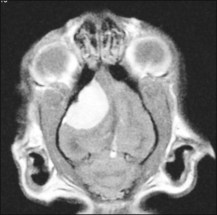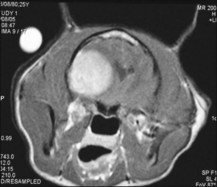11 Loss of house-training
DIFFERENTIAL DIAGNOSIS
CASE WORK-UP
MRI: a large contrast-enhancing broad-based peripherally-attached mass on the right (Fig. 11.1).
DIAGNOSIS
Surgical removal of the mass confirmed the diagnosis of meningioma and resulted in a dramatic improvement in the cat’s mental state which returned to normal. No seizures were noted postoperatively. The cat remains normal several years after the surgery (Fig. 11.2).
Brain tumours
What is wrong with my pet?
The overall incidence of brain tumours in the canine population is quoted as 0.01% to 3%. To put that in context, the overall incidence of seizures, from any cause, in the dog population is about 3%. Every general practice sees a few new seizure cases a year, so it stands to reason each veterinary practice would also be seeing similar numbers of dogs with brain tumours. (The comparison of seizures to tumours is not to imply that the latter causes the former. It was made to give a sense of proportion to a clinical occurrence.) To re-use a bankrupt expression, brain tumours are ‘not uncommon’.
Stay updated, free articles. Join our Telegram channel

Full access? Get Clinical Tree




